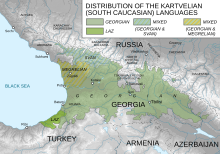Mingrelians
 Distribution of Mingrelian in relation to the other Kartvelian languages | |
| Total population | |
|---|---|
| c. 400,000 | |
| Regions with significant populations | |
| Languages | |
| Mingrelian, Georgian | |
| Religion | |
| Predominantly Eastern Orthodox Christianity (Georgian Orthodox Church) | |
| Related ethnic groups | |
| Other Georgians, Lazs |

| Part of a series on |
| Georgians ქართველები |
|---|
 |
| Nation |
| Georgia |
| Ancient Kartvelian people |
| Subgroups |
| Culture |
| Languages |
| Religion |
| Symbols |
| History of Georgia |
The Mingrelians or Megrelians[a] (Mingrelian: მარგალეფი, romanized: margalepi; Georgian: მეგრელები, romanized: megrelebi) are an indigenous Kartvelian-speaking ethnic subgroup of Georgians[2][3][4][5][6][7] that mostly live in the Samegrelo-Zemo Svaneti (Mingrelian: სამარგალო, romanized: samargalo; Georgian: სამეგრელო, romanized: samegrelo) region of Georgia. They also live in considerable numbers in Abkhazia and Tbilisi.
The Mingrelians speak the Mingrelian language, and are typically bilingual also in Georgian. Both these languages belong to the Kartvelian language family.[8][9][10]
History
In the 13th century BC, the Kingdom of Colchis was formed as a result of the increasing consolidation of the tribes inhabiting the region, which covered modern western Georgia. The endonym margalepi (მარგალეფი) is presumably reflected in the Greek Manraloi (Μάνραλοι), recorded as a people of Colchis by Ptolemy in the 2nd century BC.
By the mid-3rd century, the tribe of Colchis, establishing the kingdom of Lazica. In the 5th century, the first Christian king Gubazes I declared Christianity as a state religion of Lazica. Locals began to have closer contact with the Greeks and acquired various Hellenic cultural traits, including in some cases the language. From 542 to 562, Lazica was a scene of the protracted rivalry between the Eastern Roman and Sassanid empires, culminating in the Lazic War. Emperor Heraclius's offensive in 628 AD brought victory over the Persians and ensured Roman predominance in Lazica until the invasion and conquest of the Caucasus by the Arabs in the second half of the 7th century.
In the 7th century Lazica fell to the Muslim conquest; however, in the 8th century combined Lazic and Abasgian forces successfully repelled the Arab occupation. In 780 Lazica was incorporated into the Kingdom of Abkhazia as a result of dynastic succession, the latter led the unification of the Georgian monarchy in the 11th century. The nobility and clergy of Lazica switched from the Hellenic ecclesiastic tradition to the Georgian, and Georgian became the language of culture and education.
Notable Mingrelians
- Konstantine Gamsakhurdia (1893–1975), one of the most influential Georgian writers of the 20th century[11]
- Zviad Gamsakhurdia (1939–1993), the first President of Georgia[12] (in office: 1991–1992)
- Lavrentiy Beria (1899–1953), Soviet chief of secret police in the later Stalin era[12]
- Merab Kostava (1939–1989), Georgian dissident, poet, musician, National Hero of Georgia[13]
- Ambrosi Khelaia (1861–1927) Catholicos-Patriarch of all Georgia
- Şevkefza Sultan (c. 1825 – 1889), Ottoman Valide sultan in 1876
- Guram Gabiskiria (1947–1993) National Hero of Georgia
- Zhiuli Shartava (1944–1993) National Hero of Georgia
- Geno Adamia (1936–1993) National Hero of Georgia
- Zaza Damenia – Georgian army corporal, National Hero of Georgia
- Alexander Berulava (1945–1993) was awarded Vakhtang Gorgasali First grade order for his courage and heroism in the fight for the protection of the homeland and its territorial integrity
- Khvicha Kvaratskhelia (b. 2001) – Georgian professional footballer who plays as a winger for the Italian Serie A side S.S.C. Napoli and the Georgia national team.
See also
Notes
- ^ Alternately, Megrelians, Mingrels or Megrels
References
- ^ Including Abkhazia, where 46,000 Mingrelians and Georgians live. <ref name="census.2010"
- ^ Stuart J. Kaufman Modern Hatreds: The Symbolic Politics of Ethnic War ::Modern Hatreds: The Symbolic Politics of Ethnic War], p 86: "Additionally, the Georgian category includes an array of politically important subgroups especially Mingrelians, Svans and Ajarians"
- ^ Kevin Tuite "The Meaning of Dæl. Symbolic and Spatial Associations of the South Caucasian Goddess of Game Animals". Université de Montréal.
- ^ Tunç Aybak Politics of the Black Sea: Dynamics of Cooperation and Conflict, p 185: "... Georgians (Megrels) ..."
- ^ Andropov, New Challenge to the West, by Arnold Beichman, Mikhail S. Bernstam, p 116: "Georgia consists of three ethnics tribes: Imeretians, Kartvels, and Mingrelians."
- ^ Small Nations and Great Powers: A Study of Ethnopolitical Conflict, by Svante E. Cornell, p 142
- ^ Political Construction Sites: Nation-building in Russia and the Post-Soviet World, by Pål Kolstø, p. 8
- ^ "South Caucasian Languages « Sorosoro".
- ^ Congress, The Library of. "LC Linked Data Service: Authorities and Vocabularies (Library of Congress)". id.loc.gov.
- ^ "SOUTH CAUCASIAN - LanguageServer - University of Graz". Archived from the original on 2016-03-04. Retrieved 2011-03-18.
- ^ Rayfield, Donald. Stalin and His Hangmen: The Tyrant and Those Who Killed for Him. Random House Digital, Inc., 2005: p. 354
- ^ a b Cite error: The named reference
McCauley, Martin 1900. pg. 1was invoked but never defined (see the help page). - ^ Hoiris, Ole. Yurukel, Sefa. Contrasts and solutions in the Caucasus. Aarhus University Press, 1998: p. 187
Bibliography
- Stephen F. Jones. Mingrelians. World Culture Encyclopedia.

